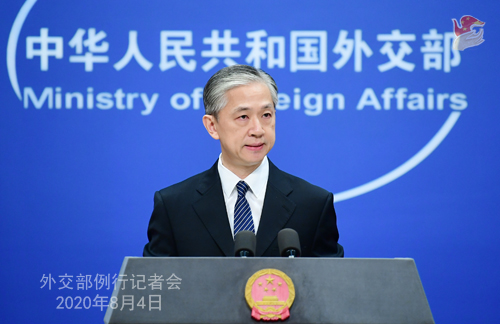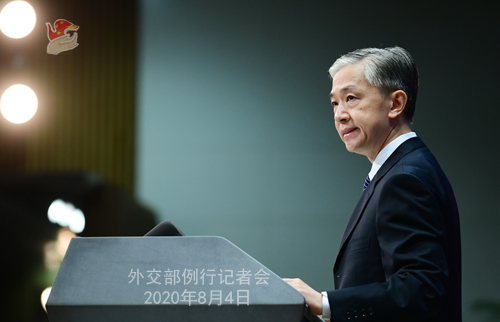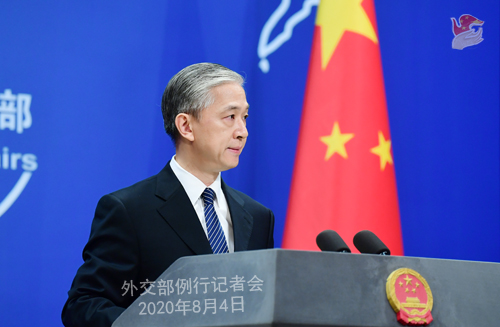| Foreign Ministry Spokesperson Wang Wenbin's Regular Press Conference on August 4, 2020 |
| 2020-08-04 23:05 |
|
The Chinese government has decided to send a medical expert team to Azerbaijan to help it fight COVID-19. This medical expert team, organized by the National Health Commission and selected by the Sichuan Provincial Health commission, has left for Azerbaijan on August 4. AFP: France yesterday said that it is halting ratification of an extradition treaty with Hong Kong because the new national security law has undermined Hong Kong's high degree of autonomy and fundamental freedoms. So does China have any response to that? Wang Wenbin: France's erroneous remarks and action concerning Hong Kong constitute interference in China's internal affairs, which China is firmly opposed to. The Law on Safeguarding National Security in the Hong Kong SAR is not only fully in line with the principle of "one country, two systems", but also will ensure its stable and long-term implementation. It is simply not tenable to say that it violates the "one country, two systems" and undermines Hong Kong's high degree of autonomy and fundamental freedoms. CCTV: India's External Affairs Minister S. Jaishankar said in an interview on August 2 that India-China relations have important implications not only for the two countries but also for the world. Both sides must have an accurate understanding of each other's concerns and interests. The basis for the China policies adopted by successive Indian governments is that India and China have gradually normalized bilateral relations while maintaining peace and tranquility in the border areas. The situation on the border and bilateral relations with China cannot be separated. Reaching an equilibrium with China is not going to be easy and India must stand its ground and part of the answer is to "occupy more of their mind space". What is China's comment? Wang Wenbin: China has noted relevant reports. We also believe that stronger solidarity and cooperation between China and India, the two largest developing countries and emerging economies, will not only inject strong impetus into our respective development, but also add stability and positive energy to world peace and prosperity. The two sides should always place the boundary issue in an appropriate position in bilateral relations and prevent differences from escalating into disputes. It is hoped that India will work with China in the same direction and jointly safeguard the overall interests of bilateral relations with concrete actions. China Daily: The Russian Foreign Ministry issued a statement on August 3 as it marks the one year anniversary of US walking away from the INF Treaty. They said that "we still believe Washington made a grave mistake. After abandoning the treaty Washington immediately embarked on completing the development of missiles previously banned under the treaty. The US publicly announced its intention to deploy advanced missiles as soon as possible, primarily in the Asia-Pacific Region. The deployment of US ground-based short- and intermediate- range missiles in various parts of the world will seriously undermine regional and global security and provoke a new and dangerous round in the arms race". Do you have any comment? Wang Wenbin: This revealing statement by the Russian side has unveiled the real intention of the US withdrawal from the INF Treaty. Since its pullout from the INF Treaty one year ago, the US has withdrawn from more international treaties and organizations. It has announced decisions to unsign the Arms Trade Treaty (ATT), withdraw from the Open Skies Treaty, unilaterally loosen its standards on Unmanned Aerial Systems (UAS) export control as a Missile Technology Control Regime (MTCR) member state, and has not agreed to extend the New START Treaty yet. The above-mentioned negative measures of the US have seriously undermined regional and global peace and security, impacted the international arms control and disarmament process, weakened mutual trust between major countries, damaged global strategic stability, and exposed its true intention of pursuing unilateralism and seeking military hegemony. China firmly opposes the US deployment of land-based medium-range missiles in the Asia-Pacific and Europe. We urge the US side to earnestly respond to the concerns of the international community and do more to contribute to regional and world peace and stability.
South China Morning Post: The Global Times Editor-in-Chief Hu Xijin tweeted that the US side hasn't renewed visa of Chinese journalists and the Chinese side will retaliate, suggesting that US journalists in Hong Kong may be targeted. Do you have any comment? Wang Wenbin: We noted relevant reports. On May 8, the US limited visas for Chinese journalists to 90 days, requiring them to apply for visa renewal every 90 days. As we understand, relevant Chinese journalists already applied for visa extension but none of them has received reply from the US side. For a while, the US, entrenched in the Cold War mentality and ideological bias, launched one round of political suppression after another against Chinese media. In December 2018, it demanded relevant Chinese media organization's US office to register as "foreign agent". Since 2018, the US has indefinitely delayed approval and even denied application of visa for 20 US-based Chinese journalists. In February 2020, the US designated five Chinese media organizations in the US as "foreign missions" and then placed a cap on the number of their staff, in effect expelling 60 Chinese journalists. In May, the US limited visas for Chinese journalists to 90 days. In June, the US again added four additional Chinese media organizations in the US to the list of "foreign agents". I want to stress that Chinese journalists have followed journalism ethics and the principle of objectivity, fairness, truthfulness and accuracy when conducting reporting activities across the world, including in the US. The relevant US actions have severely disrupted Chinese journalists' normal reporting activities, gravely damaged the reputation of the Chinese media and affected the normal people-to-people exchanges between the two sides. While priding itself on freedom of the press, the US now wilfully obstructs the Chinese media from doing their job. Such a two-faced behavior exposed its hypocrisy in so-called freedom of the press, and is nothing short of double standards and hegemonic bullying. We said many times that the US caused the current situation and is responsible for it. The US should immediately correct its mistakes and stop its political oppression on the Chinese media and journalists. If the US is bent on going down the wrong path and doubles down on its mistakes, China will be compelled to make necessary and legitimate reactions to firmly safeguard its legitimate rights and interests. You also asked whether US journalists in Hong Kong will be affected. I want to tell you that the HKSAR is part of China. The Central Government has the diplomatic authority to react to US oppression of Chinese media organizations in the US. AFP: The head of the WHO Tedros said yesterday that international experts including Chinese experts will travel to Wuhan to identify the potential source of infection for the new coronavirus. Can you tell us maybe when these experts are supposed to come to China? Wang Wenbin: You may have noted the information released by China's National Health Commission. After consultation between the two sides, the WHO sent two experts to China to conduct preparatory consultations on scientific cooperation in tracing the origin of the novel coronavirus from July 11 to August 2. During their stay in China, the experts held multiple talks with Chinese experts and held in-depth exchange on scientific progress in crowd, environment, molecular and zoonotic tracing of the origin as well as plans for the next stage. Following the spirit of the resolution on COVID-19 response adopted at the 73rd WHA, experts of the two sides formulated the China part of a global scientific cooperation plan on origin-tracing to further research the zoonotic source, intermediate host and transmission route of the novel coronavirus so as to better prevent and control the pandemic. As to the specifics you are interested in, the two sides will remain in communication regarding the next-step scientific research plans. China Review News: A handful of politicians have been drumming up so-called desinicization of industrial chains, claiming that they will pay companies to leave China. What's your take on this? Wang Wenbin: Since COVID-19 broke out, China has acted fast to bring the epidemic under control and resume work and production. According to the data from the National Bureau of Statistics of China, the Chinese economy registered a 3.2 percent growth in the second quarter, making it the first major economy to report positive growth. China's manufacturing PMI stands at 51.1 in July, above the 50-point mark for the fifth consecutive month. There isn't and will not be mass evacuation of foreign investment and withdrawal of industrial and supply chains from China. On the contrary, thanks to the stable expectation of recovering Chinese economy, improving business environment, enormous market advantages and potential domestic demand, many foreign companies have been setting up operations in China at a faster pace and proactively expanding in China. According to a recent questionnaire survey conducted by the Ministry of Commerce, 99.1% of foreign-funded enterprises indicated that they would continue to invest and operate in China. The US-China Business Council's recent survey of over 150 businesses also shows that China's steps to expand opening-up and optimize business environment have provided convenience to foreign companies in China and US companies remain optimistic about the Chinese market. The third China International Import Expo (CIIE) being prepared has seen more registrations from renowned companies compared to last year, and the average exhibition area of Fortune 500 and leading companies will be up by 14%, fully demonstrating global businesses' confidence in China's economic growth and prospects. I want to stress that China stays committed to greater opening-up with the door of cooperation wide open. We believe China and other countries will together make the pie of win-win cooperation bigger and bigger.
Reuters: India is considering measures to prevent trade partners mainly in Southeast Asia from re-routing Chinese goods to India with little added value. How do you comment about this? Wang Wenbin: China has noted relevant reports. Chinese products exported to India meet the demand of India's domestic market and the needs of production and life for the Indian people. Practical cooperation between the two countries is mutually beneficial and win-win. It is not in India's own interest to sabotage this pattern of cooperation. AFP: European Union foreign policy chief Josep Borrell yesterday criticized the decision to postpone the Hong Kong Legislative Council elections. He said that would undermine democracy in Hong Kong. Do you have any comment on that? Wang Wenbin: Like I said yesterday, the Hong Kong SAR Government's decision to postpone the election in the face of the raging pandemic is a justified and necessary step to ensure people's safety and health and a safe, fair and just election. Many countries and regions have put off elections due to epidemics and other disasters and the Hong Kong SAR government followed this common practice in making this legitimate, reasonable and lawful decision. I want to stress that Hong Kong is China's special administrative region and the HKSAR's legislative council election is China's local election, thus purely Hong Kong's internal affairs. No foreign government, organization or individual has any right or reason to interfere. Beijing Youth Daily: For some time, the US biological militarization activities overseas have caused great concern and raised many questions and objections. For example, recently, the ROK media have repeatedly reported that the US military stationed in the ROK have conducted activities violating the Biological Weapons Convention (BWC), and a large number of social groups there have demanded the closure of relevant US military laboratories and the expulsion of relevant US troops stationed in the ROK. What is China's comment? Wang Wenbin: I have noted relevant situation. The US has conducted activities of biological militarization in many countries which have indeed caused widespread skepticism and opposition. The reasons are as follows: first, those US biological militarization activities are not transparent. Many of the countries involved have no idea what the US military labs are doing. The US is the one that has conducted the largest number of biological militarization activities overseas, none of which is mentioned in the CBMs submitted by the United States to the BWC. Second, they are not safe. Many of their activities are closely related to high-risk pathogens. If any accident occurs, it will have disastrous consequences for the country concerned, its neighbors and the whole world. Third, they are unjustified. Looking around, only the US, spearheaded by its military, is building biological labs around the world and collecting without restraint biological resources abroad, and only the US is opposed to negotiating a BWC verification protocol. No matter how the US explains it, it cannot justify itself. We urge the US side to act in an open, transparent and responsible manner, take the concerns of the international community seriously, clarify its overseas biological militarization activities, earnestly fulfill its BWC obligations, and stop standing alone in the way of negotiations on a BWC verification protocol. AFP: Donald Trump said yesterday that TikTok will be out of business in the US if it is not sold to a US company before September 15. Does China have any comment on this new move? Wang Wenbin: For a while, without providing any evidence, the US has stretched the concept of national security and abused its state power to bring down certain non-US enterprises. Such practice goes against market economy rules and the WTO principles of openness, transparency and non-discrimination. It is a blatant act of bullying, to which China firmly opposes. We have noticed that it has also drawn a flurry of criticisms and doubts in the US and from the international community. The US cited national security as the grounds for its oppression of relevant businesses, but this turns out to be a flimsy excuse they made. Relevant companies do business in the US in accordance with market principles and international rules, and abide by US laws and regulations. However, the US side imposes restrictions and oppresses them on the pretext of trumped-up charges, which is nothing but political manipulation. In fact, it is nothing new for the US to use its state machine to suppress foreign companies, which Toshiba and Alstom both fell prey to. The hypocrisy of the so-called fair competition touted by the US has been laid bare, seriously damaging its national credibility and image. If the US goes this way, then any country can take similar measures against any US company on the grounds of national security. The US must not open Pandora's box, or it will suffer the consequences. We call on the US side to heed the rational voice at home and from the international community, refrain from politicizing economic issues, provide an open, fair, just and non-discriminatory business environment for market players from other countries to invest and operate in the US, and do more that is conducive to global economic development.
|
| |||||||||||||||
|
|||||||||||||||





